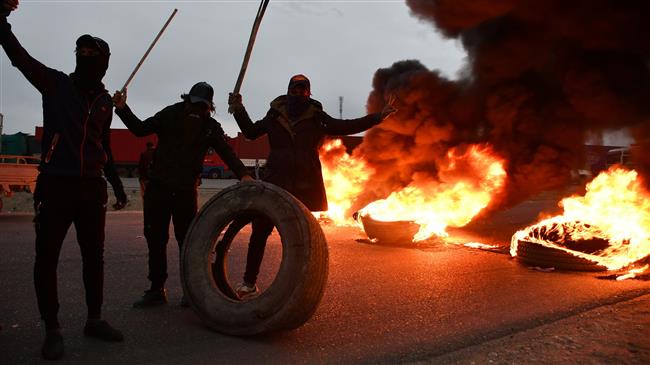Protests over economic hardships continue across Iraqís central and southern cities amid reports of infiltration by violent elements into the ranks of the demonstrators.

Demonstrations were reported on Tuesday in the capital Baghdad, the holy cities of Karbala and Najaf, as well as the southern cities of Nasiriyah, Diwaniyah, Baqubah and Amarah.
Reports also emerged of instances of violence, including the closure of urban and inter-city roads by the protesters, who set objects ablaze in the course of moving traffic.
In the capital, security forces fended off the rioters, reopening the Mohammed al-Qassim highway that connects areas in cityís Rusafa, a district to the east of the Tigris.
However, riotous elements wounded a member of the security forces using a muffled weapon. The Baghdad Security Operations Command Center said the victim had been injured in the stomach, while some social media activists posted pictures of him online.
A day earlier, violent outfits had engaged security forces, throwing stones and firebombs that injured as many as 14 of them.
The Command Center, meanwhile, published pictures of some of those arrested in the previous days over sowing unrest and disturbing public order.
In Najaf, protests also witnessed the blocking of streets, junctures, and bridges, and forced closure of some schools, but failed to entirely disrupt daily activity.
Some protesters prolonged the closure of the highway linking Nasiriyah to Baghdad - which links the southern port city of Basra to the capital and northern provinces - for a second consecutive day.
In Amarah, the capital of Maysan Province, rioters brought routine operations to a near standstill in the city, where only health facilities, the municipality, and security apparatuses managed to keep offering their services.
Also on Tuesday, Iraqís High Commission for Human Rights said at least 10 people had been killed in the previous two days of violence in Baghdad, Karbala, Basra, and the western province of Diyala. Over 130 others were also wounded, it added.
The commission said its teams "have also documented the presence of some demonstrators who have blocked main roads connecting the provinces, burned tires, continued closure of official departments and educational institutions, and the disruption of many public facilities that provide services to citizens."
Protests erupted in the country on October 1, 2019 against, what outraged public has specified as deep-rooted corruption and dire economic conditions.
Prime Minister Adel Abdul-Mahdi stepped down amid the rallies, but keeps functioning as interim premier. The parliament also acknowledged the popular dissatisfaction, introducing an electoral law that allows voters to pick individual candidates instead of choosing from party lists.
Some protesters say the alleged corruption is to be traced back to a ruling eliteís monopoly of power since the United Statesí 2003 invasion of the Arab country.
The rallies subsided after January 3, when the United States launched a set of drone strikes against Baghdad, assassinating senior Iraqi anti-terror commander Abu Mahdi al-Muhandis and General Qassem Soleimani, commander of the Quds Force of Iranís Islamic Revolution Guards Corps (IRGC), who was visiting Iraq on an official invitation, among others.
After the assassinations, the parliament voted overwhelmingly in favor of a bill demanding expulsion of all US-led forces.
The fresh protests come ahead of a "million-man" march called by prominent Iraqi cleric Moqtada al-Sadr on January 24 to demand the withdrawal of US forces following their recent aggression in the country.
LINK: https://www.ansarpress.com/english/13074
TAGS:






























 online news tv
online news tv




